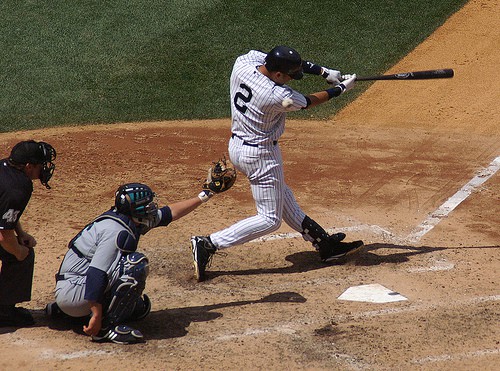More than just another game
Regular-season baseball games can be as ordinary as a trip to the mall. You go because you can, because you need something, and sometimes you come away with a steal. You get more than you expected; you’re pleasantly surprised. You go to the games to see some baseball, hope for some home runs, root for the home team and look for the highlights on ESPN when you get home.
When my friends and I bought a six-pack of Mets tickets for this season, we did so in part because we haven’t missed a Shea opener in six years and this time around, one of the six-packs offered Opening Day, not to mention five other games on convenient nights for us. Well, at least for me — no Friday or Monday games. Last night’s game was the third in our plan and it was fun to head out to the ballpark for the first game following the All-Star break. We had no reason to expect anything more than another ballgame in another summer, but when I shuffled through the door at 11 p.m., Casey could tell right away that the game had been more than just a night at the ballpark.
“Were you screaming?” she asked after I said hello in my gravelly voice, the result of a sore throat following a night of cheers and a few jeers.
The hoarseness began on a close play at third base, when Jose Reyes ran down a ball in the hole and David Wright — who scrambled up from his prone position following an unsuccessful dive for the ball — hurried to third, arriving at the same time as the ball and Atlanta’s Andy Marte. But the umpire called Marte safe on the slide. We had no reason to believe our eyes more than the umpires, considering he had the perfect angle without Wright’s body obstructing his view, and we were 300 feet away in an upper-deck box on the first-base side of home plate. But it looked good from our viewpoint.
Of course, it got really exciting after that. We’d already seen Cliff Floyd’s tumbling catch in left-field foul territory, but this time it was Wright, who had already hit two solo home runs and committed an error that allowed a runner to reach ahead of Adam LaRoche’s two-run home run that gave the Braves a 3-2 lead. On a suicide squeeze bunt attempt, Wright raced in and dove to catch the ball before it hit the ground. Marte had crossed home plate before Wright got up off the ground, then trotted back to third for the double play.
In the bottom of the eight, the Mets got two men on with one out for Mike Piazza. My friends and I said to one another how he simply needed to get the ball in play — in the air. Pop out, line out, hit a fly ball. Single. Just don’t hit into a double play. “A strikeout would almost be the best thing here,” we said. “Keep the inning alive for Wright,” who was on deck.
This is where our faith had gone. In past years, we would’ve relished the image of Piazza striding to the plate in this situation — tie game, two men on, one out. Bobby Cox had brought in a left-hander to face Floyd, and he walked him on four pitches. That was probably more planned than not. “Don’t let him beat you,” Cox might have told John Foster, “they’ve got Piazza up next.” In Atlanta earlier this year, Cox walked Floyd at least once, maybe twice, to get to Piazza, who struck out both times.
I’ve watched at least some of nearly every Mets game this season, and I’ve noticed the sometimes-slight, sometimes-steep decline of Piazza. He swings at more first pitches, missing more than he hits. He flails at balls out of the strike zone, nearly putting a knee to the ground as he whiffs at another offering in the dirt, then returns to the dugout, lips pursed, knowing he’s fading. His bat’s slower and those balls on the outer half that he used to drive up the right-center alley for doubles, or launch over the right-field wall as one of the best opposite-field power hitters in the game, are now strikes as he swings through them — or, rather, through the spot where they passed, a split second before.
 So when Giants cast-off Jim Brower got ahead on Piazza 0-2, the stranger to my right said to his girlfriend, “It’s better if he strikes out here.” We laughed, because we thought it was true. But when Brower’s letter-high fastball got too much of the plate on the outer half, Piazza’s eyes must have lit up the way mine do when I see the red circle of a fat pitch in the hitter’s hot zone in MVP Baseball. The ball carried out to right field, and first I thought it was a double down the line. But then I saw the arc and looked down at Ryan Langerhans sprinting toward the corner. I knew it was over his head, but was it too high? Would the gravity win out before it had traveled far enough to clear the wall? As Langerhans slowed when he reached the warning track, I couldn’t tell at first if it was because he had a read on it or he was going to reach the wall. But then it came down, glancing off the front edge of the loge section, and richochetted behind Langerhans. Home run.
So when Giants cast-off Jim Brower got ahead on Piazza 0-2, the stranger to my right said to his girlfriend, “It’s better if he strikes out here.” We laughed, because we thought it was true. But when Brower’s letter-high fastball got too much of the plate on the outer half, Piazza’s eyes must have lit up the way mine do when I see the red circle of a fat pitch in the hitter’s hot zone in MVP Baseball. The ball carried out to right field, and first I thought it was a double down the line. But then I saw the arc and looked down at Ryan Langerhans sprinting toward the corner. I knew it was over his head, but was it too high? Would the gravity win out before it had traveled far enough to clear the wall? As Langerhans slowed when he reached the warning track, I couldn’t tell at first if it was because he had a read on it or he was going to reach the wall. But then it came down, glancing off the front edge of the loge section, and richochetted behind Langerhans. Home run.
We stood and cheered, our cries rising as Piazza neared home plate. We kept it up through the first pitch of Wright’s at bat, prompting a curtain call from Piazza. The atmosphere at Shea was better than it usually is for a regular-season game. The size of the crowd — 43,319 — no doubt helped, but maybe it was the presence of enough Braves fans to make a difference when Atlanta scored. What brings them out to Shea when they can’t be bothered to go out to the Ted in Georgia? Nevertheless, I think their attendance brought out the best in Mets fans as we cheered to the point of exhaustion.
I don’t expect the Mets to be true contenders for the postseason, but the nature of the NL East this year means that they’re in the race, for the moment. Perhaps last night’s crowd knows that this team is a bad week away from securing last place, from trading off key players within the next two weeks. We don’t want another lost summer, another listless August, another meaningless September of playing out the stream. Last night’s game and this four-game series with the Braves is as important as any the rest of the season. The Mets can’t win two out of four anymore — at .500 heading into the game, that’s exactly what they’ve done all season. Two out of four is stagnant. That won’t cut it. Two out of three, three out of four — that’s progress. That’s what they need to do. It had to start last night, and it started with the old guard — Piazza — and the new generation — Wright’s two home runs and three runs scored, Carlos Beltran’s 4-for-4.
We’re watching Piazza’s last days as a Met. I’ve been a fan since I first saw that Mets hat atop his head as I spied SportsCenter from across a Cape Cod pizza joint in 1998. I’d admired his ability before that. I’d like to see him go out strong, sign with an AL team that visits Shea in 2006 so we can give him one last ovation, and then retire after another season or two. Then we can all make our reservations for the last weekend in July 2012, or whenever it will be, and head up to the country to see that plaque unveiled, the interlocking “NY” set in bronze on the cap on his head.



